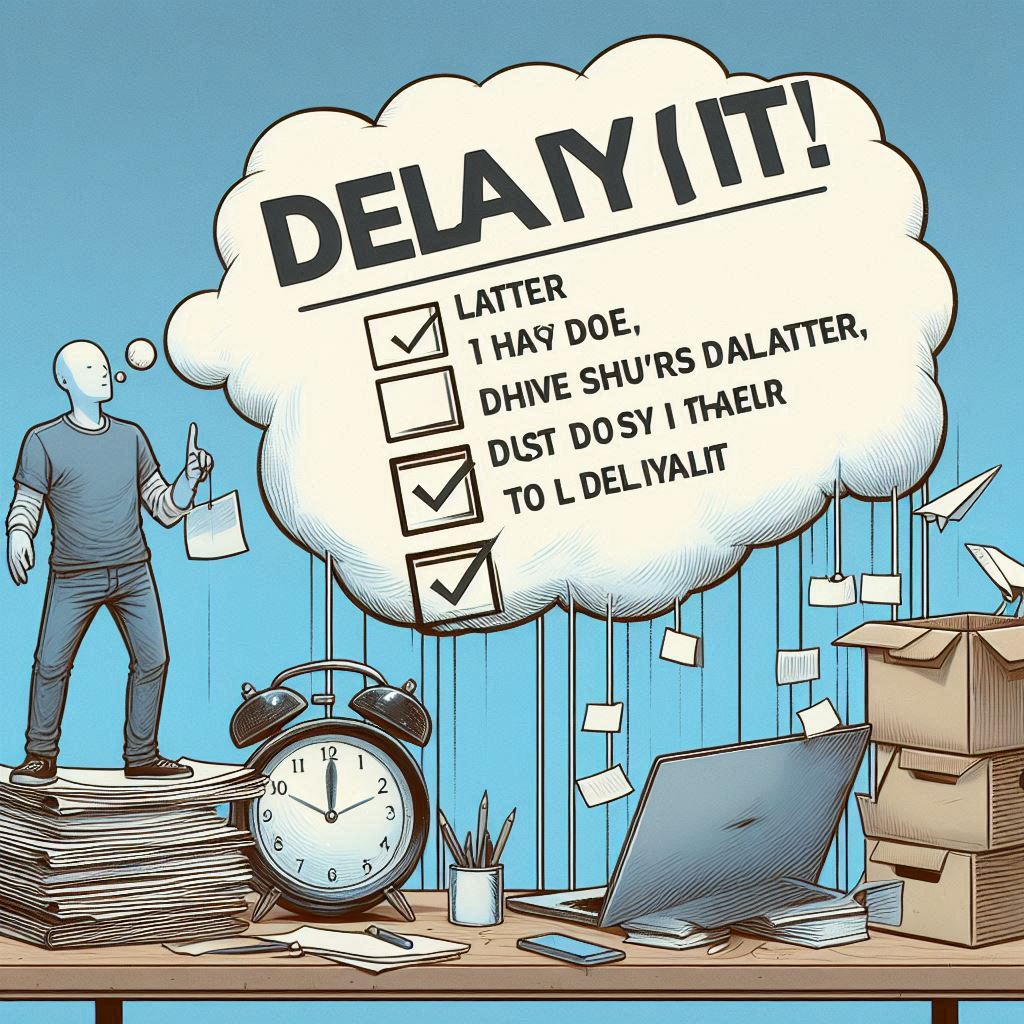You’re staring at your earlier to-do list as the workday draws to a close. One project that you’ve been putting off is at the bottom of your list. Even though it’s late, you still haven’t finished it.
You promise yourself that you’ll deal with the matter later. You grow more and more upset with yourself for not finishing it.
If any of these describes you, you’re not alone!
Almost all of us have procrastinated at some point. For a lot of people, the problem doesn’t affect their quality of life. However, if you find yourself putting things off frequently and then regretting it, you can be stuck in a vicious loop.
When you put off responsibilities at work or at home, it’s simple to be hard on yourself. However, are you deserving of criticism from yourself, or is your procrastination a sign of something more serious?
It’s critical to understand that procrastination is not a personal weakness. There are explanations for our actions, and solutions are available.

What is Procrastination?
Procrastination is defined by experts as a self-defeating pattern of conduct characterized by immediate advantages and long-term disadvantages. It’s a common experience for many of us to put off tasks that must be completed, regardless of how challenging they may be. Everybody occasionally puts things off. Procrastination, however, can have a detrimental effect on our wellbeing if it becomes a habit of delaying important tasks, even when doing so will have severe effects. It’s critical to understand that procrastination is not a personal weakness. There are explanations for our actions, and solutions are available. Negative functional and mental health hazards are linked to procrastination. Procrastinators frequently experience high anxiety levels and lack impulse control.
What is the root of Procrastination?
Procrastination is thought to be caused by issues with self-control or time management, but the situation is more nuanced than that. When people are unable to control their emotions, it is frequently the result of emotional dysregulation. People frequently put off doing tasks when they are worried or stressed about them. Other excuses that makes one feel procrastinate may involve:
- Unsure about what must be done
- Not understanding how to accomplish a task
- Not wanting to complete a task, not giving a damn if it is completed
- Not giving a damn about completion of tasks
- Not feeling motivated to complete it
- Having a tendency to put things off until the last minute
- thinking that pressure makes you perform better
- Believing you can complete it in the nick of time
- Not having the courage to begin
- Forget things
- Accusing illness or ill health
- Awaiting the ideal opportunity
- Requiring time to reflect on the assignment
- Putting off one activity in favor of another
- Underlying circumstances, such as depression.
- Low energy (for example, from sleep deprivation).
- Poor self-control (due to fatigue, for example).
- Problematic setting (such as one that’s over-lapped with distractions)
Why do People Procrastinate?
Due to an unreasonable preference for delay over action, people tend to postpone. This occurs when factors like fatigue undermine their motivation and self-control and are countered by factors like fear.
In particular, the urge to act is a measure of how hard a person can push themselves to act right now. It mostly depends on people’s drive and self-control, both of which are impacted by a number of variables. For instance, a person’s motivation can be affected by how long they have to wait to be rewarded for taking action, and their level of self-control can be affected by how exhausted they are at any particular time. Thus, problems like fatigue and distant consequences can disrupt self-regulation and motivation, which in turn lowers people’s motivation to take action. Numerous other problems, including as depression, ADHD, and low self-efficacy, can also cause this.
On the other hand, the desire to delay is a measure of how strongly people are motivated to put off acting right now. It mostly stems from the urge to feel better immediately by avoiding unpleasant feelings (like fear of a task) and amplifying pleasant emotions (like enjoyment of digital media), a behavior known as “Giving in to Feel Good.” This drive involves a number of problems that people would prefer to avoid in order to temporarily safeguard their emotions, such as worry and perfectionism.
What are the reasons for Procrastination?
You can find a list of typical causes for procrastination below. It is predicated on the psychological process described in this section, which is thought to be the underlying cause of procrastination.
- Short-term mood prioritization, or the desire to feel better now even if doing so will make you feel worse later
- Task evasiveness is the belief that a task is difficult, tedious, or unpleasant in some other way
- Fear and anxiety (caused, for example, by worries about receiving criticism)
- Feeling overloaded, as in not knowing where to begin because there are so many things to accomplish
- Perfectionism (for example, desire to publish only flawless work)
- Cut ties with your future self (e.g., thinking that someone else will suffer from the effects of your delay)
- Delayed results i.e., as a result of undervaluing incentives that won’t be available for a long time)
- Low motivation, perhaps as a result of unexpected results
- Expected effort (because of difficult work, for example)
- Inertia, or the propensity to carry on with one’s current course of action
- Abstract objectives, or those that lack a precise definition
- Cognitive biases (such as having an unrealistically low confidence in your chances of success)
- Time management problems (such as not prioritizing things)
- Problematic characteristics, such impulsivity
- Underlying actions (such as disobedience to a superior)
- Underlying circumstances, such as depression
- Low energy (for example, from sleep deprivation)
- Poor self-control (due to fatigue, for example).
- Unfavorable setting (such as one with lots of distractions).
Ways to Overcome Procrastination:
With the correct information, resources and encouragement, procrastination is a tendency that can be controlled and overcome. Here are some coping mechanisms for you.
1. Just Get Started, Whatever It Is:
The best method to overcome procrastination is to begin the task you have been putting off. Put the project aside your analysis and get to work.
You can train your mind to focus so that you may begin working on the assignment, even if it might be easier said than done.
For instance, you may choose to work for only fifteen minutes or a shorter amount of time. You can reconsider if you choose to proceed once the allotted time has passed. Even better, you can use a timer to keep yourself to this first objective. When you start a task, the rest usually comes easily. Starting the first action on your own can serve as a catalyst for further activity. It’s possible that you’ll discover the process was simpler than you anticipated.
2. Divide the Work Into Small, Manageable Chunks:
We occasionally put things off when we’re feeling stressed. Make a plan if you’ve been putting off a particular project because you think it will take too long. To begin, divide the task into more manageable, smaller portions. As a result, the entire endeavor is easier to handle. Your brain recognizes that the assignments are manageable. Steps that enable you to finish the assignments on time can also be created. You can get the task done faster and accomplish more than you might have thought possible with this methodical technique. Proceed to work on the framework that you have established. You’ll realize that you’re not putting things off as you work on this. You could also gradually experience a sense of fulfillment in place of your stress that will let go your fear and encourage you to move forward.

3. Organize Yourself Better:
Sometimes people overestimate how much they can accomplish in a given amount of time, which leads them to postpone. They might also have a sense of overwhelm due to the constant influx of work. In these situations, organizational techniques can be useful. Time management, for instance, might discourage procrastinating. Setting deadlines, ranking your tasks, and making a list of them can be a good place to start.
Setting up designated areas in your house for work that help you focus on particular tasks can also be beneficial. It is more probable that you will go to the task at hand because you will probably identify the location with the project. By shutting down your computer’s apps, you can reduce distractions. You can also focus better if you put your phone in a different room.
4. Boost Your Inspiration:
We frequently let our feelings and unfavorable thoughts to get in the way of completing the tasks at hand. When we see a task as being unimportant, we usually ignore it. Introduce positive thoughts to a task instead of resenting it. Taking tiny steps to reward yourself can help you overcome procrastination.
You can even use a positive outlook to reward yourself by finding purpose in the things you usually steer clear of. Even if you may detest the term paper you’re writing, you should concentrate on getting your college degree.
5. Recognize that you are not Idle:
Procrastination is a behavior brought on by stress in our lives or false, negative self-perceptions; it is not a sign of laziness. Try not to be too hard to yourself if you are a procrastinator. Rather, consider whether your actions could be related to anxiety, fear, depression or any other underlying problem.
Conclusion
Don’t worry if you put things off occasionally; everyone experiences this. The chores we detest the most are frequently the ones we put off until the very last minute. Despite being widespread, it’s crucial to keep in mind that this behavior can have detrimental effects on your relationships, your capacity to succeed in job and school, and your personal accomplishments.
Thankfully, there are things you can do to lessen the impulse to put it off. It can be helpful to understand why you’re having trouble getting started. Don’t forget to start simple and make a list of things that need to get done. Force yourself to complete even a simple task when you want to put it off. Sometimes the hardest part of a task is just getting started.
SOURCES
McLean Hospital 2024 – Putting People First in Health
Calendar Productivity Center 2023 – The Root of Procrastination
Newsletter 2024 – Solving Procrastination
Very Well Mind 2024 – Why we Keep Putting Things Off?
HISTORY
Current Version
September 2, 2024
Written By:
BARIRA MEHMOOD